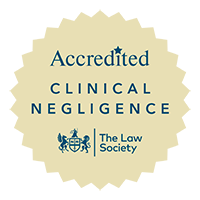Top ranked cerebral palsy claims lawyers

Boyes Turner’s cerebral palsy lawyers have secured a liability judgment and £150,000 interim (part) payment for a girl who suffered brain damage after maternity staff failed to induce labour following reduced fetal movement and other warning signs in the final days of her mother’s pregnancy.
The negligent delay in our client’s delivery caused a brain injury of the maximum severity, leaving her with severe whole body spastic/dyskinetic cerebral palsy, severe cerebral visual impairment (cortical blindness), severe learning difficulties and epilepsy. She is fed by gastrostomy. She will remain totally dependent on others for every aspect of daily living and needs full time nursing care.
Warning signs ignored in pregnancy
Our client was her mother’s third child. Her mother’s BMI was high and glucose tests were planned because she was at risk of gestational (pregnancy-related) diabetes. At 35 weeks her abdominal measurements were abnormally high. A scan at 36 weeks revealed excessive amniotic fluid around the fetus (polyhydramnios) and excessive fetal growth (macrosomia). These were warning signs of a diabetic pregnancy, which should have been recognised and followed up, as babies of mothers with polyhydramnios and diabetes are at greater risk in pregnancy.
She was seen again at 37 weeks, and then at 39 weeks when the obstetrician (childbirth doctor) noted recent reduced fetal movements. A scan revealed that the baby’s estimated weight was the same as it had been at the previous scan three weeks before. The combination of reduced fetal movements and an apparent lack of fetal growth since the previous scan should have raised serious concerns about the unborn baby’s health. Correct treatment should have been to admit the mother to hospital for induction of labour. If this had happened, our client would have been born in time to avoid her brain injury and permanent disability.
Instead, the doctor advised that she should be reviewed at 41 weeks. In fact, she was next seen by a more senior obstetrician a few days after 41 weeks and was admitted to hospital the next day. On admission, CTG monitoring of the fetal heart rate showed abnormalities indicating fetal distress, which should have prompted the maternity team to take urgent steps to deliver the baby. More than 2.5 hours later, the baby was finally delivered by C-section.
Our client was floppy, pale and unresponsive at birth with low APGAR scores. She needed intensive resuscitation. She was transferred to NICU where she was found to be hypoglycaemic (low blood sugar) and acidotic (from hypoxia or lack of oxygen). She was transferred to another hospital for cooling.
Admission of liability and interim payment
Our client’s family asked us to help them pursue a claim for compensation for their daughter’s injury from the defendant hospital. We investigated and put the claim to the defendant, which admitted liability. We obtained a court judgment and an early interim (part) payment of £150,000 to help the family move to more suitable accommodation, appoint a case manager and meet their daughter’s immediate needs for care, whilst we work with our experts and the child’s family to understand the impact of our client’s injury over her lifetime and assess the full value of the claim.
If you are caring for a child or young adult with cerebral palsy or neurological disability caused by medical negligence and would like to find out more about making a claim, contact us by email at cerebralpalsy@boyesturner.com.
They have a great deal of knowledge and expertise, and client care seems to be their top priority.
Chambers Guide to the Legal Profession
Contact our expert Cerebral Palsy solicitors today for support with your claim




